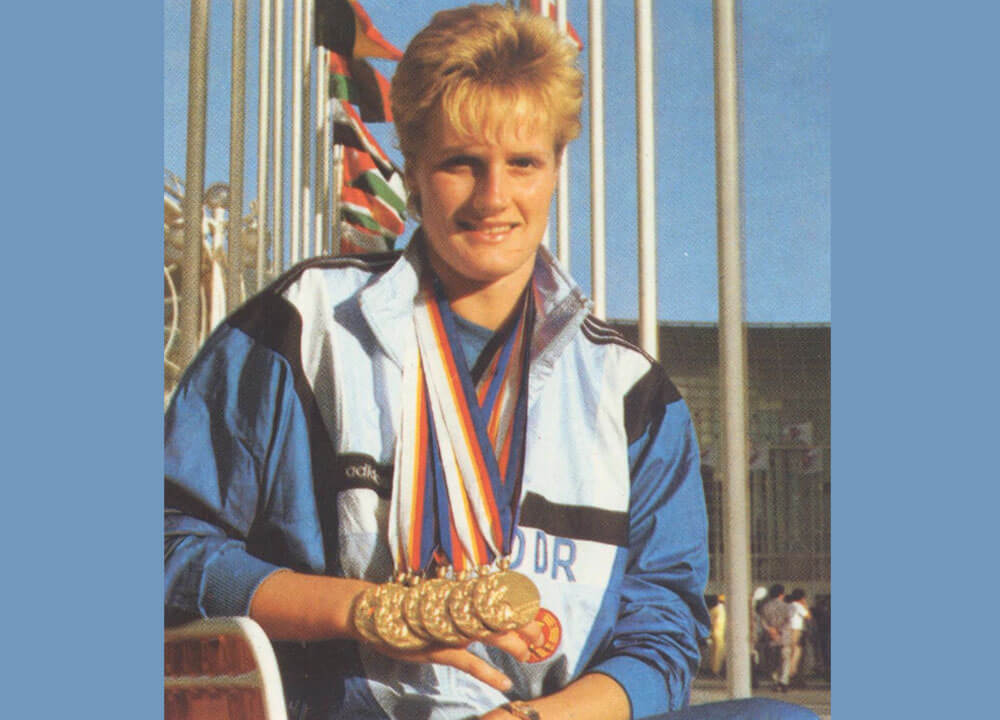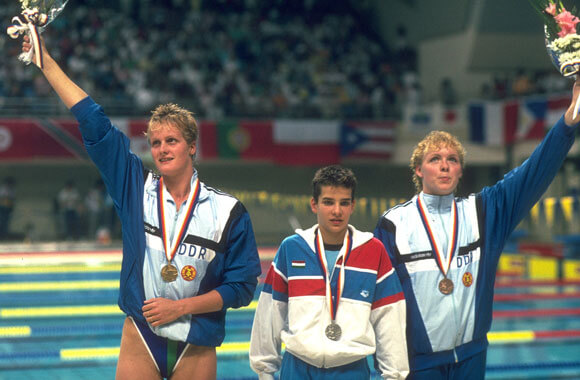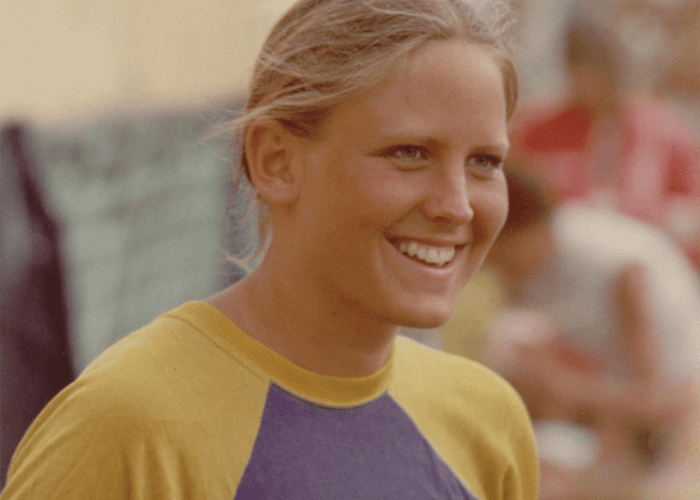The 35th Anniversary of Kristin Otto and An Olympic Golden Haul Under Dark Clouds

Tarnished Gold: How the Success of Kristin Otto Was Smoke and Mirrors
This month marks the 35th anniversary of the 1988 Olympic Games in Seoul. It was an Olympiad known for the excellence of Janet Evans and Matt Biondi, but also for the questions that surrounded East German star Kristin Otto, who walked away from South Korea with six gold medals.
The image is iconic in Olympic lore. As he crossed the finish line, index finger pointing to the sky, Canadian Ben Johnson was the most-celebrated athlete on the planet. He had just won the 1988 Olympic title in the 100-meter dash, his winning time of 9.79 almost impossible to grasp. How could a human run that fast? It was a legitimate question, and one asked with significant skepticism.
An answer arrived within days, and the Seoul Games fell under a tent of controversy. Johnson, in what was an unsurprising revelation to those who raced against him, had tested positive for the use of an anabolic steroid, and was stripped of his gold medal. Journalists, who were hardly stunned by the news they would chase, immediately worked to cover the story of Johnson’s doping violation, while Johnson boarded a flight out of South Korea.
The news of Johnson’s positive test coincided with the last days of the swimming competition, where two storylines stood out. Among the men, Matt Biondi’s march to seven medals, including five gold, drew comparisons to what Mark Spitz achieved at the 1972 Olympics in Munich. Although Biondi did not match Spitz’s perfection, he became just the second swimmer to tally seven medals in a single Games.
In women’s action, East Germany’s Kristin Otto occupied the spotlight, and headlined her nation’s dominant showing by setting an Olympic standard for individual success. During the eight-day meet, Otto was perfect, her four individual triumphs complemented by a pair of relay victories. If the program had included a women’s 800 freestyle relay, as the men’s schedule did, she almost certainly would have equaled Spitz’s iconic effort from 16 years earlier. Still, her six gold medals set a record for female success at the Olympic Games, a standard that has not been equaled.
But like Johnson, suspicions followed Otto, who was pegged at a young age to attend one of East Germany’s prestigious sports schools. From the early 1970s through the late 1980s, East Germany was the dominant country in the pool, destroying the opposition at the European Championships, World Championships and Olympic Games, and all other competitions in between. Even without official proof in the form of positive doping tests, there was little doubt unethical practices were at play.
During the first years of the 1970s, East Germany was a modest factor on the global stage. Yet, by the 1973 World Championships, East Germany was a superpower, and that status would remain for the next decade and a half. How did such an ascension take place? It wasn’t difficult to recognize the reason. Fingers pointed to chemistry.

Krisztina Egerszegi, silver over 100m backstroke, flanked by Kristin Otto, left, and Cornelia Sirch – Photo Courtesy – Hungarian Swimming Federation
Not only was East Germany’s sudden and widespread success enough to activate prolonged skepticism, so were the physical characteristics of the athletes – abnormal musculature, deep voices, acne-covered skin. It was also said that the country’s systematic-doping program was so specific, that athletes were monitored prior to competition and removed from action if there was the slightest possibility they would test positive for a performance-enhancing substance.
Otto was used to the allegations levied against her, and her teammates.
“I have never knowingly taken any banned substances,” Otto said. “I have no knowledge of ever having taken something to help my performance.”
There is a key word in Otto’s statement – knowingly. Throughout the duration of East Germany’s doping program, the teenage girls who were used as pharmaceutical guinea pigs and pin cushions simply did as they were told. Swallow this pill. Take this injection. Follow this workout. And…do not ask questions.
Kornelia Ender did not question the system. Neither did Barbara Krause. Petra Thumer followed the directives that were prescribed. Petra Schneider was obedient, too. And because these women could not say no, or have their careers instantly washed away, they set dozens of world records and enjoyed vast international success.
The same could be said for Otto.
After being identified as a future star, it did not take long for Otto to emerge as a major force. As a 16-year-old at the 1982 World Championships, Otto notched her first international success, capturing three gold medals – highlighted by a solo title in the 100 backstroke. The next year’s European Championships brought three more medals, but the opportunity to shine on the biggest sporting stage was delayed.
In retaliation for the United States-led boycott of the 1980 Olympic Games in Moscow, 14 Eastern Bloc countries decided to skip the 1984 Games in Los Angeles. Leading this charge were the Soviet Union and East Germany, and the decision meant Otto had to wait an additional four years to etch her name in Olympic history.
Although 1984 was a loss for Otto on the Olympic front, she made the most of the campaign by setting a world record in the 200 freestyle and winning five medals at the Friendship Games, a replacement meet for the Olympics that provided boycotting nations the chance to experience some level of competition. In 1985, Otto was out of the pool for most of the year, sidelined by an injury that left her in a neck brace for nine months.
By the 1986 World Championships in Madrid, though, Otto had regained her pre-injury form, and set the foundation for two years in the future – the 1988 Games in Seoul. At the World Champs, Otto collected six medals, four of them gold, with individual titles earned in the 100 freestyle and 200 individual medley. Her triumph in the 100 free arrived in world-record time and the mark endured as the global standard for more than five years.
A year later, Otto was just as superb, revealed in the five-gold exhibition at the European Championships that included solo wins in the 100 freestyle, 100 backstroke and 100 butterfly. There was no doubt she was prepared to make her Olympic debut, and her ability to win international titles in a variety of events received considerable acclaim. Wolfgang Richter, East Germany’s head coach in Seoul, admired Otto’s mental approach, especially in the face of great pressure to excel.
“She’s the best because she works harder than the rest,” Richter said. “She’s tough (in the mind). She cannot stand to lose.”
Her long Olympic wait over, Otto immediately shined in Seoul. In the first event of the meet, she won the 100 freestyle by more than a half-second. That win was followed by decisive victories in the 100 backstroke and as a member of the East German 400 freestyle relay. The last three days of action produced one gold medal per day, wins in the 100 butterfly and 50 freestyle sandwiching her contribution on the victorious 400 medley relay.

Photo Courtesy: Swimming World Magazine
In a flash, Otto possessed six gold medals in as many events. There were no world records, which was a slight surprise, but Otto was an individual winner in three different strokes, an effort that prompted five-time United States Olympic coach Don Gambril to compare her to American legend Tracy Caulkins. It was an odd comparison for a U.S. coach to make considering how Team USA, particularly Shirley Babashoff, had long questioned the legitimacy of East German’s success.
Otto simply took the end of her Olympiad in stride, noting that she had exceeded expectations and would fondly look back at the week. When asked about her involvement with doping, she pointed to the fact that she had never tested positive and was one of the most-tested athletes in the world.
“Personally, I never gave much thought to this because it would have been too much of a burden if you think of a gold in every event,” Otto said. “I’m 22 and that is not so young anymore in this sport, so I have a very difficult decision to make (concerning retirement). I’m sure we will be very popular (back home). People will stop us in the street. But I’m also sure this will not change my life.”
Upon reflection, Otto spurned retirement for a year after Seoul. In what proved to be the bow on her international career, she won four medals at the 1989 European Championships, including a gold in the 100 backstroke. She followed her competitive days by pursuing a journalism degree and has been a longtime television journalist in Germany.
What Otto has not been able to avoid in retirement are links between her and performance-enhancing drugs. Upon the fall of the Berlin Wall in the early 1990s, a plethora of East German secrets were revealed, among them the details of the country’s systematic-doping program, known formally as State Plan 14:25. In documents recovered from the Stasi, the East German secret police, Otto’s name was listed among those supplied with anabolic steroids. Even when presented with this evidence, Otto denies her knowledge of the process. Yet, others have copped to the program of which they were part, including Rica Reinisch, a three-time gold medalist at the 1980 Olympics in Moscow. In addition to admitting that she was supplied performance-enhancing drugs by her coaches and East German medical personnel, Reinisch has criticized Otto for not admitting the obvious, and what is documented.
“When she claims she cleaned up in Seoul without taking anything, then I can only say she didn’t win six golds by drinking buttermilk,” Reinisch once said.
A 1993 inductee to the International Swimming Hall of Fame, Otto’s exhibit now includes a doping disclaimer. The same disclaimer is attached to the displays of Ender, Krause, Thumer and Ulrike Richter, among others. It reads: “In a German court of law, after this swimmer was inducted into the International Swimming Hall of Fame, team officials confessed to administering performance enhancing drugs to this swimmer, who therefore obtained an illegal and unfair advantage over other athletes.”
Otto will long be remembered as a highly decorated athlete, and for turning in one of the greatest Olympic outings in history. In this age of enhanced depth, the notion of another female athlete winning six gold medals – four of them individually – is unlikely. When Michael Phelps won his eight gold medals in Beijing, he relied on two miracles to keep perfection alive.
Simultaneously, what Otto accomplished, before and in Seoul, will always be tainted. How much did steroids aid her? What could she have achieved through only her natural talent? These are questions that will never be answered. Instead, she’ll be forever connected to doping. More, their Seoul link will keep Otto and Johnson inseparable. The difference? He was caught. She got away.
“I’ve been facing (doping questions) for years,” Otto once said. “It is nothing new for me. Unfortunately, I can no longer rule (doping) out. However, I cannot imagine it because I was one of the most checked athletes in the world at the time.”
Doubt will always linger.




My question is, why are these DDR swimmers from the 70’s and 80’s still in the International Swimming Hall of Fame? FINA and IOC refused to rescind the results of years of East German cheating, and change the medal recipients in official records other than putting an * next to them. As one of many swimmers that had my medal placement changed by their cheating ( Bronze in the 800 m in Montreal behind Shirley Babashoff and Petra Thumer), I have always had empathy for those who now admit the tainting of their achievements. Those who don’t acknowledge it, like Thumer and Otto, I don’t have a lot of respect for.
Even if the ladies knew what they were given, they lived in East Germany. No one said no when the government told them to do something. The ladies could have been sent to a re-education camp if they refused.
Well said Wendy. Why on earth won’t FINA rescind the medals and acknowledge the correct medal winners? It is not that hard but so very important to those athletes who were effected.
I for one would love to be acknowledged as World Champion from 1982 World Champs in Ecuador where I achieved 2nd place behind Cornelia Sirch who broke the WR and won convincingly.
Cornelia has admitted to being part of the doping program albeit unknowingly at the time.
Those DDR (and other communist) athletes enjoyed great accolades and acknowledgement of their achievements at the time. Perhaps now those who missed out could at least enjoy the honour of the results being corrected.
It is not too late.
Agreed. My 5th in Seoul in 200 fly would be bronze.
Kristen was awarded a gold crown with inlayed jewels as the most valuable athlete of the 1988 Games. The award should go to the athlete voted second most valuable.
Matt Biondi
I agree!
As one of those swimmers who had to compete against the East Germans, including Kristin Otto, and who lost out on hearing my/our national anthem being played because of their drug enhanced performances, I couldn’t agree more with Wendy Weil and Matt Biondi. I do feel some sadness, for Otto and the rest, however, as they too have to live with a burden – the burden of knowing they didn’t win fairly and that their bodies were altered most likely forever.
Sue Walsh
Proud 1980 Olympic Team Member
My cousin was placed in one of those Sports Schools. Every morning at breakfast they were supplied with a handful of pills. If they asked they were told it was vitamins.
The IOC should have at least recognized the real winners of those events won by drug aided athletes.
As a swimmer who competed against Otto in 1988 I feel both sadness and anger. Sadness that these athletes were subjected to the East German system and unknowingly took substances that for many have had long term effects on their health. But anger from a personal perspective of never knowing where I would have finished in a fair field. I do know my fourth should have been a bronze and wonder how this would have changed things for me. I am also angry that while the disclaimer exists, why have these results been allowed to stand?
Canadians suffered the indignity of being the only host country not to win an Olympic Gold Medal. The East German drug aided athletes stole what would have been the greatest Canadian Olympic performance of all time. Without the East German cheats, Canadian swimming ladies would have won 3 Gold, 6 silver and 3 Bronze medals. In the 100 back Canada would have swept the podium. This group of ladies was already arguably the highest performing Canadian Olympic Swimming Team but without the East Germans they would have been legendary.
I have heard of many swimmers in the 80s taking pills and growing strangely. And they were actually from different countries, not just the FDR. I find it all very sad and hard to point fingers… who was clean actually? sometimes i wonder
Even in current era, ppl can compete with performance enhancing drugs as long as they have doctor’s notes. They are still benefitting from it. Nothing is clean in these games.
As far as I know, no other nation engaged in a systemic program anything like that if the GDR, so the fact that other individuals also cheated is a false comparison.
She certainly – like Hi Chihong in 1994 – stole a gold medal from Egerszegi.
Are you sure that Egerszegi was clean???
Total cheat – just sayin…………….
One thing that is never being really discussed is that these swimmers were more victims than offenders. The article rightly says that they had no choice. What it doesn’t say is the impact it had on many swimmers. I saw testimonies of female swimmers who fell sick of cancer or had such hormonal issues that they were never able to have children. These women were instruments in a dictatorship. To now punish them for this seems a bit unfair – most of them have already suffered enough. For Kristin Otto, I can say that she never had the same ‘unified German success’ in terms of career/money as other swimmers did after the reunification. She is a journalist and works hard, yes, but most Germans don’t even know she was a 6-times gold medal winner.
Very true!
Who will judge faiorly after more than 40 years?
Which new aspects and proofs are on the table 20 years
after the end of the East German state?
Who can proof that all other swimmers were clean at that time? And are they now???
Everybody in the scene knows that there were organized doping in many other countries.
Finish this witch-hunt if you are not able to present proofs which will persist also in a CAS trial.
Yes, she was tested, but as discussed in detail in “Faust’s Gold”, the GDR had a two-pronged plan; one prong to give athletes steroids, and a second prong to find ways to avoid/circumvent the testing protocols and obtain “clean” results via masking agents and other processes. She — and all GDR medalists identified in the Stasi files — should have the grace to return those medals.
Awesome post, really enjoyed reading it! https://danieldantas.mystrikingly.com/